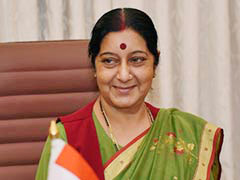New Delhi, June 19: India Thursday said the 40 Indian workers abducted in Iraq were safe and told the distraught families that the "very best" efforts were on to have them freed.
External Affairs Minister Sushma Swaraj told a delegation of families of seven of the abducted men that all 40 workers were safe but did not disclose where they were being held.
The government was making all possible efforts to free the construction workers seized in Mosul, one of the major Iraqi cities over run by Sunni insurgents.
"I am personally mulling over all options. The government is making all kinds of efforts. We are not leaving any stone unturned," Sushma Swaraj told reporters here.
"The 40 men are safe... When the situation normalizes, we will try to get them released," she told the delegation that was accompanied by Punjab Chief Minister Parkash Singh Badal.
She said the men, who worked for a Turkish company and were mostly from Punjab, were holed up in a government building.
A spokesperson for the family members said the minister told them that the workers were abducted while being taken to a safe place following the outbreak of fighting in Mosul.
"The minister said blank passports and tickets would be issued to them so that they can be brought back when they are released," said Manjit Singh G.K., president of the Delhi Sikh Gurudwara Management Committee.
Manjit Singh was a part of the delegation that met the minister.
India has sent to Baghdad a veteran diplomat, Suresh Reddy, a former envoy to Iraq, to tap his extensive contacts in that country to ensure an early release of the construction workers.
Sushma Swaraj said earlier that she was "personally supervising" the rescue efforts.
"I want to assure the families that the government and I will try our very best... make every effort."
Badal had also earlier vowed to make every effort to ensure the release of the workers.
Food Processing Industries Minister Harsimrat Kaur Badal said meanwhile that the affected families in Punjab had been told to alert the authorities if they get a telephone call from the workers.
She added that Prime Minister Narendra Modi was personally monitoring the developments.
"Our prime minister and the external affairs ministry are closely monitoring the situation," Harsimrat Badal said.
The mother of one of the Indians, Gurdeep Singh, expressed dismay over the mass abduction.
"We don't know where he is," the woman said in Punjab. "He has not called for many days. I hope he is safe."






Comments
Add new comment